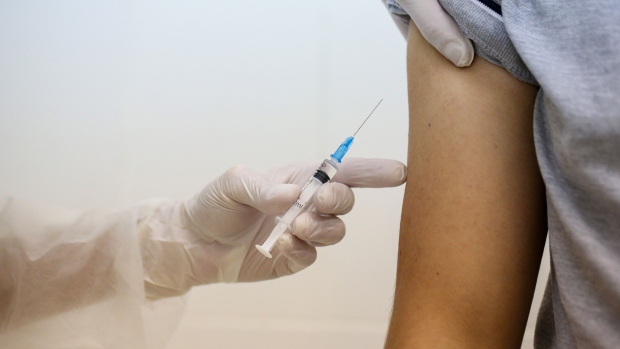Oct 14, 2020
Russia approves second COVID-19 vaccine before Phase 3 trials
, Bloomberg News

Russian health authorities approved a COVID-19 vaccine created by a former biological weapons research laboratory for public use, marking the second time the Kremlin has bypassed accepted scientific protocol as it tries to field a defense against the pandemic.
A vaccine developed by the Vector State Virology and Biotechnology Center in Siberia has been registered, President Vladimir Putin said in televised comments Wednesday.
“We need to increase production of our first and now our second vaccine,” Putin said. “First of all we should supply the domestic market.” Russia will also work with foreign partners to boost output, he said.
Vector’s drug was registered before completing Phase 3 trials, two months after Putin announced approval of Sputnik V as the world’s first coronavirus vaccine. Even so, Deputy Prime Minister Tatyana Golikova said it is safe and the first 60,000 doses will be produced soon. She told Putin she had already tried the vaccine and not suffered any side effects.
The development comes as Putin seeks to play a leading role in battling the global pandemic that has hit Russia particularly hard. Sputnik V’s developer says more than 50 countries have expressed interest in the vaccine, with orders for 1.2 billion doses since it was registered by Russian regulators in August.
A third vaccine, developed by Moscow’s Chumakov Federal Scientific Center, may be registered by December, Golikova said at the meeting with Putin. Phase 2 clinical trials begin Oct. 19, she said.
Record Infections
With a second wave of coronavirus cases sweeping Russia and threatening to overwhelm hospitals, the Kremlin also needs the vaccine domestically as it battles record daily infection rates while seeking to avoid a repeat of a nationwide lockdown in the spring that battered the country’s economy. Russia has had more than 1.3 million infections, the fourth highest globally after the U.S., India and Brazil, and added a record 14,231 new cases over the last day.
Like Sputnik V, Vector’s EpiVacCorona vaccine was tested on only a limited number of people before receiving provisional registration. There were 100 volunteers in Phase 1 and 2 trials and all feel fine, Vector General Director Rinat Maksyutov said last week.
No data has been published in a peer-reviewed journal to date on those trials. Russian authorities say the “conditional” registration is similar to fast-track programs in the West and China and will allow them to ramp up production while testing continues.
However, scientists and pharmaceutical companies say more testing is necessary to prove safety and effectiveness before such vaccines should be certified for use.
The U.S. is attempting to fast-track vaccine development too, after U.S. President Donald Trump authorized Operation Warp Speed in April to support companies with federal funding.
Smallpox Lab
Vector, a lab in the outskirts of Novosibirsk that worked to weaponize smallpox during the Soviet period, developed its vaccine using peptide antigens, or synthetic fragments of the virus, to provoke an immune response to COVID-19.
Its candidate joins a handful of vaccines that are in Phase 3 trials, led by Moderna Inc., the University of Oxford working with AstraZeneca Plc, and the partnership of Pfizer Inc. and BioNTech SE.
Some potential vaccines have run into hurdles during Phase 3. Johnson & Johnson ordered a temporary halt in its late-stage trial this week after a patient became ill, while AstraZeneca has paused testing in the U.S. since early September after a patient came down with unexplained neurological symptoms.
Vector plans Phase 3 trials on 30,000 people starting in November or December, state-run Tass news service reported Oct. 6, citing Rospotrebnadzor. The head of Rospotrebnadzor, Anna Popova, said she already received the inoculation and felt no side effects.
Sputnik V is currently undergoing Phase 3 trials on 40,000 people and may announce preliminary results next month, with full data available in 2021.


